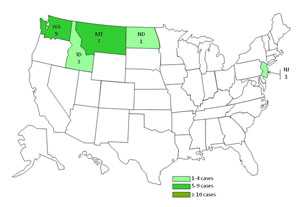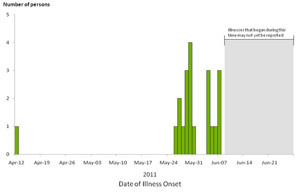Investigation Announcement: Multistate Outbreak of Human Salmonella Enteritidis Infections Linked to Alfalfa Sprouts and Spicy Sprouts
June 28, 2011
On this Page
Introduction
CDC is collaborating with public health officials in many states and the U.S. Food and Drug Administration (FDA) to investigate a multistate outbreak of Salmonella Enteritidis infections linked to alfalfa sprouts and spicy sprouts. There is no connection between this Salmonella outbreak and the European E. coli O104:H4 outbreak. Investigators are using DNA analysis of Salmonella bacteria obtained through diagnostic testing to identify cases of illness that may be part of this outbreak.
As of June 27, 2011, a total of 21 persons with the outbreak strain of Salmonella Enteritidis have been reported from 5 states: Idaho (3), Montana (7), North Dakota (1), New Jersey (1) and Washington (9). Among persons for whom information is available, illnesses began between April 12 and June 7, 2011. Ill persons range in age from 12 years to 77 years old, with a median age of 35 years old. Seventy-one percent are female. Among the 10 ill persons with available information, 3 (30%) persons have been hospitalized. No deaths have been reported.
The outbreak can be visually described with a chart showing the number of people who became ill each day. This chart is called an epidemic curve or epi curve. Illnesses that occurred after June 9, 2011, might not be reported yet due to the time it takes between when a person becomes ill and when the illness is reported. This takes an average of 2 to 3 weeks. For more information, please see Salmonella Outbreak Investigations: Timeline for Reporting Cases.
Investigation of the Outbreak
Collaborative investigative efforts of local, state, and federal public health and regulatory agencies have linked this outbreak to Evergreen Produce brand alfalfa sprouts and spicy sprouts. The sprouts were distributed to various customers in Idaho, Montana, Washington State, and possibly to retailers in neighboring states. CDC, FDA, and state and local public health partners are continuing surveillance to identify new cases and trace potentially contaminated products. CDC will continue to update the public on the progress of this investigation as information becomes available.
Clinical Features/Signs and Symptoms
Most persons infected with Salmonella bacteria develop diarrhea, fever and abdominal cramps 12 to 72 hours after infection. The illness usually lasts 4 to 7 days, and most persons recover without treatment. However, in some persons, the diarrhea may be so severe that the patient needs to be hospitalized. Salmonella infection may spread from the intestines to the bloodstream, and then to other body sites and can cause death unless the person is treated promptly with antibiotics. The elderly, infants and those with impaired immune systems are more likely to have a severe illness from Salmonella infection. More general information about Salmonella can be found here.
Sprouts and Foodborne Illness
Since 1996, there have been at least 30 reported outbreaks of foodborne illness associated with different types of raw and lightly cooked sprouts. Most of these outbreaks were caused by Salmonella and E. coli infections.
Advice to Consumers and People who Sell or Serve Food
- Contaminated product may still be in grocery stores and in consumers’ homes. The alfalfa sprouts and spicy sprouts are sold in plastic bags labeled “Evergreen Produce” or “Evergreen Produce Inc.” The alfalfa sprouts are packaged in 4-ounce and 16-ounce plastic bags with pre-printed labels. They are also packaged in 1-pound and 5-pound plastic bags with stick-on labels. The spicy sprouts are packaged in 4-ounce plastic bags with pre-printed labels and 1-pound plastic bags with stick-on labels.
- Customers who purchased this product should return it to the place of purchase for a refund or dispose the sprouts in a closed plastic bag placed in a sealed trash can. This will prevent people or animals from eating them.
- Persons who think they might have become ill from eating potentially contaminated sprouts should consult their health care providers.
- Children, the elderly, pregnant women, and persons with weakened immune systems should avoid eating raw sprouts of any kind (including alfalfa, clover, radish, and mung bean sprouts).
- Cook sprouts thoroughly to reduce the risk of illness. Cooking thoroughly kills the harmful bacteria.
- Request that raw sprouts not be added to your food. If you purchase a sandwich or salad at a restaurant or delicatessen, check to make sure that raw sprouts have not been added.
- More information about illnesses associated with sprouts can be found on Foodsafety.gov.
CDC's Role in Food Safety
CDC leads federal efforts to gather data on foodborne illnesses, investigate foodborne outbreaks and monitor the effectiveness of prevention and control efforts. CDC is not a food safety regulatory agency but works closely with the food safety regulatory agencies, in particular, with FDA and U.S. Department of Agriculture’s Food Safety and Inspection Service. CDC also plays a key role in building state and local health department epidemiology, laboratory and environmental health capacity to support foodborne disease surveillance and outbreak response. Notably, CDC data can be used to help document the effectiveness of regulatory interventions.
Get email updates
To receive email updates about this page, enter your email address:
Contact Us:
- Centers for Disease Control and Prevention
1600 Clifton Rd
Atlanta, GA 30333 - 800-CDC-INFO
(800-232-4636)
TTY: (888) 232-6348 - New Hours of Operation
8am-8pm ET/Monday-Friday
Closed Holidays - cdcinfo@cdc.gov




